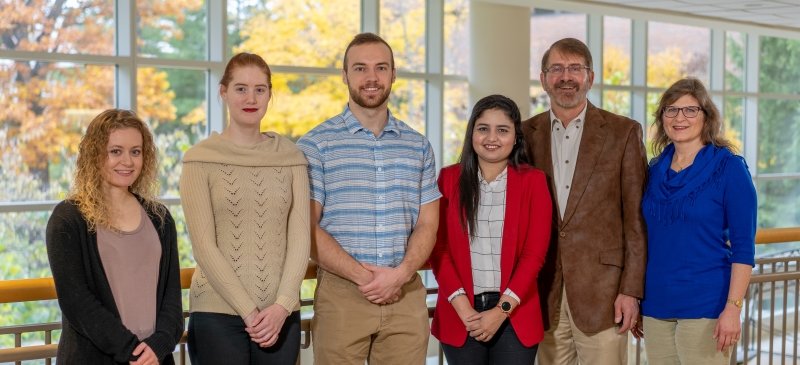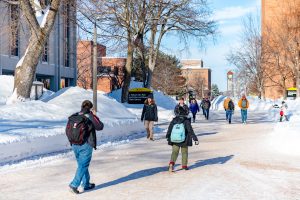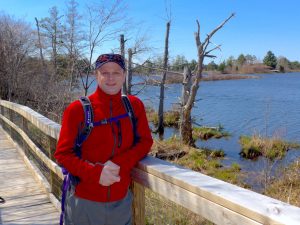
Matthew Songer, (Biological Sciences ’79) and Laura Songer (Biological Sciences ’80) have generously donated funds to the College of Sciences and Arts (CSA) to support a research project competition for undergraduate and graduate students. Remembering their own eagerness to engage in research during their undergraduate years, the Songers established these awards to stimulate and encourage opportunities for original research by current Michigan Tech students. The College is extremely grateful for the Songers’ continuing interest in, and support of, Michigan Tech’s programs in human health and medicine. This is the second year of the competition.
Students may propose an innovative medically-oriented research project in any area of human health. The best projects will demonstrate the potential to have broad impact on improving human life. This research will be pursued in consultation with faculty members within the College of Sciences and Arts. In the Spring of 2019, the Songer’s gift will support one award for undergraduate research ($4,000) and a second award for graduate research ($6,000). Matching funds from the College may allow two additional awards.
Any Michigan Tech student interested in exploring a medically related question under the guidance of faculty in the College of Sciences and Arts may apply. Students majoring in any degree program in the college, including both traditional (i.e., biological sciences, kinesiology, chemistry) and nontraditional (i.e., physics, psychology, social science, bioethics, computer science, mathematics) programs related to human health may propose research projects connected to human health. Students are encouraged to propose original, stand-alone projects with expected durations of 6 – 12 months. The committee also encourages applications from CSA students who seek to continue research projects initiated through other campus mechanisms, such as the Summer Undergraduate Research Fellowship (SURF) program, Pavlis Honors College activities or the Graduate Research Forum (GRF).
Funds from a Songer Award may be used to purchase or acquire research materials and equipment needed to perform the proposed research project. Access to and research time utilizing University core research facilities, including computing, may be supported. Requests to acquire a personal computer will be scrutinized and must be fully justified. Page charges for publications also may be covered with award funds, as will travel to appropriate academic meetings. This award may not be used for salary or compensation for the student or consulting faculty.
To apply:
- Students should prepare a research project statement (up to five pages in length) that describes the background, methods to be used, and research objectives. The statement also should provide a detailed description of the experiments planned and expected outcomes. Students must indicate where they will carry out their project and attach a separate list of references/citations to relevant scientific literature.
- The application package also should provide a concise title and brief summary (1 page) written for lay audiences.
- A separate budget page should indicate how funds will be used.
- A short letter from a consulting faculty member must verify that the student defined an original project and was the primary author of the proposal. The faculty member should also confirm her/his willingness to oversee the project. This faculty letter is not intended to serve as a recommendation on behalf of the student’s project.
Submit applications as a single PDF file to the Office of the College of Sciences and Arts by 4:00 p.m. Monday, April 22. Applications may be emailed to djhemmer@mtu.edu.
The selection committee will consist of Matthew Songer, Laura Songer, Shekhar Joshi (BioSci) and Megan Frost (KIP). The committee will review undergraduate and graduate proposals separately and will seek additional comments about the proposed research on an ad-hoc basis from reviewers familiar with the topic of the research proposal. Primary review criteria will be the originality and potential impact of the proposed study, as well as its feasibility and appropriateness for Michigan Tech’s facilities.
The committee expects to announce the recipients by early May of 2019. This one-time research award will be administered by the faculty advisor of the successful student investigator. Students will be expected to secure any necessary IRB approval before funds will be released. Funds must be expended by the end of spring semester 2020; extensions will not be granted. Recipients must submit a detailed report to the selection committee, including a description of results and an accounting of finds utilized, no later than June 30, 2020.
Any questions may be directed to Megan Frost (mcfrost@mtu.edu), David Hemmer (djhemmer@mtu.edu) or Shekhar Joshi (cpjoshi@mtu.edu).

